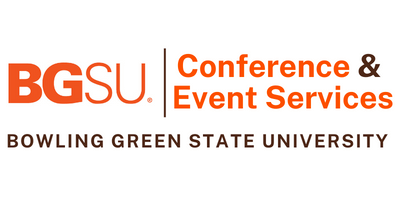BGSU C&ES Green Event Certification
Event Planning
Marketing/Communications
- Go digital. Instead of using paper, send out invitations through email, telephone, or social media
- Create a website for the event and consider using online registration to limit paper use
- Try using recycled paper and vegetable-based ink for any paper products needed
- Choose reusable decorations. Avoid promotional products and decorations with dates on them; dateless decorations can be used again the following year
- Instead of plastic table cloths, opt for washable fabric napkins and table cloths
- Provide reusable name badges for attendees
Location
- Hosting your meetings, luncheons, and events on campus will reduce transportation impacts. Contact BGSU Catering Services to discuss meal options
- When choosing a time and place for the event, consider spaces that allow for natural light and are energy efficient
- If your event involves multiple locations, ensure that they are within walking distance of each other to limit car travel
- Choose a centrally located venue depending on who your attendees are and how far they will be traveling for the event
Transportation
- Encourage biking / walking when weather and location permits
- Publicize all options for public or alternative transit such as carpooling, BGSU Shuttle, biking, and walking on the event website and marketing materials
- Hire shuttles to transport participants to the event site if it is off campus
- Consider making your event available as a webinar or video conference for those attendees who are not local
Food
- Choose finger-food appetizers that do not need any utensils
- If the appetizers are bite-size, offer napkins instead of plastic plates
- Avoid individually packaged snacks and appetizers. Instead, serve food in bulk. Some examples include plates of cookies, fruit platters, and bowls of pretzels
- Offer mainly vegetarian entrée options. Vegetarian meals reduce the amount of carbon and methane released and are often healthier meals
- While it is not always possible to completely avoid meat products at events, serving chicken and turkey instead of beef and offering fewer meat dishes will go a long way to improving the sustainability of your event
- If the event is catered, insist on seafood options that are Marine Stewardship Council certified to ensure that the fish species served are not endangered and suppliers do not have aquaculture practices that damage habitats
- Purchase seasonal, local foods, to eliminate the environmental damage caused by shipping foods thousands of miles
- Order root vegetable trays in the winter and limit your fresh fruit selections to the summer, spring, and fall when possible
Drinks
- Order Fair Trade, Shade Grown coffee for daily office use and special events. Fair Trade coffee ensures farmers receive a fair price for the coffee and ensures fair labor conditions. Shade grown coffee helps protect rainforests, particularly bird habitats, and requires fewer chemicals
- Buy drinks and snacks in bulk to reduce transportation impacts by avoiding multiple deliveries
- Avoid using bottled water when possible. Instead, offer tap water in pitchers or water dispensers to decrease plastic waste and save money
- Encourage office members to use their own mugs rather than providing disposable cups
- Use compostable cups. Food Services now offer biodegradable paper and plastic cups for campus events
Dining Packaging
- Use reusable dish ware whenever possible. For your next event, ask Dining Services to bring reusable glass or china plates instead of the disposable plastic or paper dish ware
- Buffet lunches use less packaging and result in less waste than both bagged and boxed lunches
- When constrained to bagged or boxed lunches, choose bagged lunches. Bagged lunches use less energy to produce and move through the recycle stream faster
- Instead of individual condiment packages, offer condiments in bulk
Event Implementation
Waste and Recycling
- If you use any disposables at your event, make sure that you encourage your attendees to utilize the silver recycling bins placed strategically throughout the student union
- If you are using catering for your event, they will handle waste and dispose of the recycling in accordance with the University single stream recycling program
- Don’t waste food. For small events, such as an office party or a dorm gathering, encourage students, colleagues, and workers to take leftover food home
Energy Use
- Consider a location that utilizes natural light at the site. If the event is being offered during the daytime during warm weather, consider an outdoor event
- Unplug projectors and other electronics when they are not in use
- If extra lighting is necessary, use LED lights at event location
- If using a vendor for lighting needs, ask if LED lights are available
Participant Education
- Make participants aware of your sustainability objectives by announcing them at the beginning of the event
- Provide frequent visual and verbal reminders to attendees to recycle and reduce waste during the event
- Encourage the return of items such as name tag holders so they can be used for future events
Event Completion
Clean-Up
- If you know you’re going to have a lot of trash and / or recyclable materials, please notify Conference and Event Services Staff ahead of time
Reporting
- Follow up the green event with an evaluation of success
- Write and distribute a press release about the event’s successes
Resources
Adapted from the University of Notre Dame Office of Sustainability - http://green.nd.edu/programs/green-actions/green-event-certification/
BGSU Conference and Event Services - https://www.bgsu.edu/bowen-thompson-student-union/conference-and-event-services.html
BGSU Bowen Thompson Student Union - https://www.bgsu.edu/bowen-thompson-student-union.html
BGSU Dining Services - http://www.dineoncampus.com/bgsu/
Updated: 01/12/2026 10:18AM

